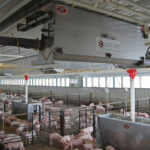AGCO Holds First Africa Summit in Berlin
AGCO held its first ever AGCO Africa Summit yesterday in Berlin, Germany. The Summit is a joint initiative of AGCO, Bayer CropScience and DEG – Deutsche Investitions- und Entwicklungsgesellschaft mbH. “With its population poised to double in the next 20...
AGCO Holds First Africa Summit in Berlin
AGCO held its first ever AGCO Africa Summit yesterday in Berlin, Germany. The Summit is a joint initiative of AGCO, Bayer CropScience and DEG – Deutsche Investitions- und Entwicklungsgesellschaft mbH. “With its population poised to double in the next 20... AGCO held its first ever AGCO Africa Summit yesterday in Berlin, Germany. The Summit is a joint initiative of AGCO, Bayer CropScience and DEG – Deutsche Investitions- und Entwicklungsgesellschaft mbH. “With its population poised to double in the next 20 years, it is a global responsibility to develop a new vision for agriculture in Africa,” said Martin Richenhagen, Chairman, President and CEO at the opening press conference. “Our objective is to promote international dialogue to encourage global businesses to invest in the future of Africa.”
AGCO held its first ever AGCO Africa Summit yesterday in Berlin, Germany. The Summit is a joint initiative of AGCO, Bayer CropScience and DEG – Deutsche Investitions- und Entwicklungsgesellschaft mbH. “With its population poised to double in the next 20 years, it is a global responsibility to develop a new vision for agriculture in Africa,” said Martin Richenhagen, Chairman, President and CEO at the opening press conference. “Our objective is to promote international dialogue to encourage global businesses to invest in the future of Africa.”
The goal of the AGCO Africa Summit was to raise awareness for the needs of the African continent and to discuss the challenges of agriculture with regard to the world food supply problem, declining arable land base and population growth. Guest speakers included Thabo Mbeki (former President of South Africa), Prof. Dr. Horst Köhler (former Federal President of Germany), Dirk Niebel (Federal Minister of Economic Cooperation and Development of Germany), and Ilse Aigner, (Federal Minister of Food, Agriculture and Consumer Protection of Germany). Panelists included Jose Pacheco (Minister of Agriculture of Mozambique), Roberto Rodrigues (Former Minister of Agriculture of Brazil), Bärbel Dieckmann (President of Welthungerhilfe) and Omari Issa (CEO of The Investment Climate Facility for Africa) – to name a few.
Participants at the AGCO Africa Summit discussed the many ways that agricultural mechanization could secure better futures and how improved cultivation methods could increase yields significantly. Higher productivity and efficiency would in turn help African countries become less dependent on imported crops, creating better food security. “Large areas across Africa have suitable soil and climate for successful agriculture, but many areas are not yet cultivated or are not productive enough,” explained Richenhagen. “With 11 percent of the world’s arable land (86 percent of which is uncultivated) Africa would benefit from modern, mechanized farming techniques.”
With over 50 years of experience in Africa through its Massey Ferguson tractor brand, AGCO already leverages alliances with governments, foreign investors and donors to improve agricultural practices in Africa. AGCO plans to fund the development of Model Farms and Training Centers in Zambia, Ethiopia, Morocco, Libya, Algeria and South Africa that will allow local farmers and dealers to be trained on new farming technology. Hubertus Mühlhäuser, Senior Vice President, General Manager, Europe, Africa, Middle East commented, “The solution for African agriculture is to develop strategic partnerships to deliver crops that feed an increasing population in an economically, environmentally and socially responsible way. With decades of dependency on food aid and the world’s fastest population growth, Africa’s long-term prospects will require increasing degrees of self-sustainability.”
With a global population of 7.0 billion people growing to 8.9 billion people by 2050 (estimated by the World Bank), food production has to increase, which means global farm productivity will need to improve to meet the growing needs. Africa holds the key to ensuring a sustainable food supply, but only if a new vision for agriculture is developed, harnessing both the expertise of the private industry sector and the knowledge of local communities.
What is your vision for agriculture in Africa?



